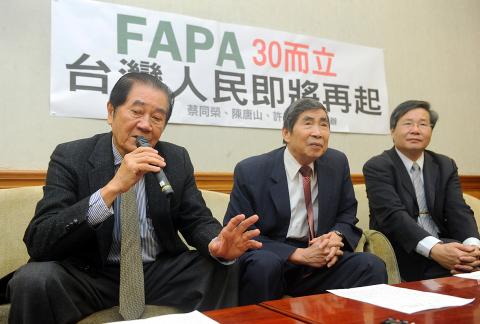Pioneering democracy activists yesterday reminisced about the establishment and the achievements of the Formosan Association for Public Affairs (FAPA) ahead of its 30th anniversary and said the organization’s main goal would be safeguarding Taiwan’s sovereignty.
“In terms of diplomacy and protection of human rights in Taiwan, the association has done more in the past 30 years than the Chinese Nationalist Party (KMT) administration has,” former Democratic Progressive Party (DPP) lawmaker Chai Trong-rong (蔡同榮) and former foreign minister Mark Chen (陳唐山), FAPA’s first and second presidents, told a press conference.
Chai and Chen, high-school classmates in Chiayi, had never imagined that they would enjoy prominent political careers when they began advocating independence for Taiwan in the US in the 1960s and established the FAPA in Los Angeles, California, on Dec. 8, 1982.

Photo: Liao Chen-hui, Taipei Times
Today, FAPA is a Washington-based lobbying organization made up of 53 chapters and more than 3,000 members that promotes Taiwan-US relations and cooperation as well as rights and interests of the Taiwanese.
According to Chai, the birth of FAPA was accidental because the overseas Taiwanese students wanted to establish a radio station in Guam at first.
With the Taiwanese-American community’s success to help Taiwan gain a quota of 20,000 immigrants to the US per year — after the original quota of 20,000 was given to China due to the establishment of diplomatic relations between China and the US, democracy advocates in the US thought it was the right time to establish an organization like FAPA.
“Young people are probably not aware of what the FAPA has done, because they are too young to experience the Martial Law period and the days of serious infringement of human rights in Taiwan. But I’m proud to say that FAPA had played a pivotal role in helping Taiwan become a democracy it is today,” Chen said.
However, Chen said the organization would have to shift its focus from human rights to Taiwan’s sovereignty, as the latter had been eroded tremendously since President Ma Ying-jeou (馬英九) took office in 2008.
Taiwan Solidarity Union Legislator Hsu Chung-hsin (許忠信) is scheduled to make a speech at the ceremony of FAPA’s 30th anniversary, which former vice president Annette Lu (呂秀蓮) and DPP representative to the US Joseph Wu (吳釗燮) would also attend, at San Jose, California, on Saturday.

Taiwanese can file complaints with the Tourism Administration to report travel agencies if their activities caused termination of a person’s citizenship, Mainland Affairs Council Minister Chiu Chui-cheng (邱垂正) said yesterday, after a podcaster highlighted a case in which a person’s citizenship was canceled for receiving a single-use Chinese passport to enter Russia. The council is aware of incidents in which people who signed up through Chinese travel agencies for tours of Russia were told they could obtain Russian visas and fast-track border clearance, Chiu told reporters on the sidelines of an event in Taipei. However, the travel agencies actually applied

New measures aimed at making Taiwan more attractive to foreign professionals came into effect this month, the National Development Council said yesterday. Among the changes, international students at Taiwanese universities would be able to work in Taiwan without a work permit in the two years after they graduate, explainer materials provided by the council said. In addition, foreign nationals who graduated from one of the world’s top 200 universities within the past five years can also apply for a two-year open work permit. Previously, those graduates would have needed to apply for a work permit using point-based criteria or have a Taiwanese company

The Shilin District Prosecutors’ Office yesterday indicted two Taiwanese and issued a wanted notice for Pete Liu (劉作虎), founder of Shenzhen-based smartphone manufacturer OnePlus Technology Co (萬普拉斯科技), for allegedly contravening the Act Governing Relations Between the People of the Taiwan Area and the Mainland Area (臺灣地區與大陸地區人民關係條例) by poaching 70 engineers in Taiwan. Liu allegedly traveled to Taiwan at the end of 2014 and met with a Taiwanese man surnamed Lin (林) to discuss establishing a mobile software research and development (R&D) team in Taiwan, prosecutors said. Without approval from the government, Lin, following Liu’s instructions, recruited more than 70 software

Chinese spouse and influencer Guan Guan’s (關關) residency permit has been revoked for repeatedly posting pro-China videos that threaten national security, the National Immigration Agency confirmed today. Guan Guan has said many controversial statements in her videos posted to Douyin (抖音), including “the red flag will soon be painted all over Taiwan” and “Taiwan is an inseparable part of China,” and expressing hope for expedited reunification. The agency last year received multiple reports alleging that Guan Guan had advocated for armed reunification. After verifying the reports, the agency last month issued a notice requiring her to appear and explain her actions. Guan